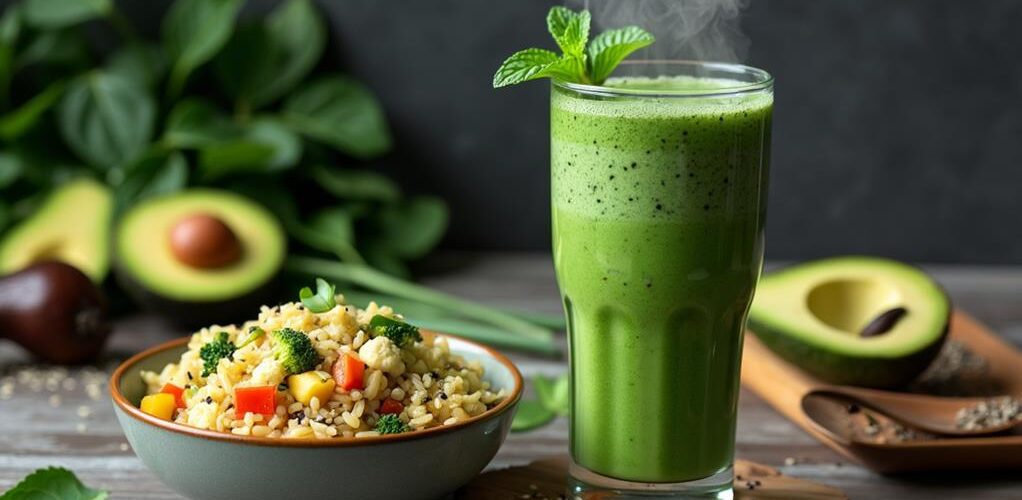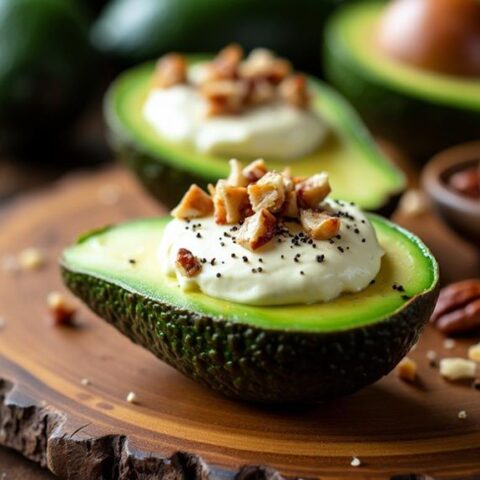
Incorporating fiber on a keto diet is essential for maintaining digestive health. Start by adding fiber-rich vegetables like spinach, broccoli, and cauliflower, which are low in net carbs. Nuts and seeds, such as chia seeds and flaxseeds, are also excellent sources. Avocado, high in both healthy fats and fiber, is a versatile daily addition. Opt for low-carb fruits such as raspberries and blackberries. Finally, consider fiber supplements like psyllium husk to boost intake. By following these tips, you can effectively balance fiber intake while staying within your keto carb limits. Explore further for extensive strategies to enhance your diet.
Key Takeaways
- Incorporate fiber-rich vegetables like spinach, kale, broccoli, and cauliflower into your meals.
- Add nuts and seeds such as chia seeds, flaxseeds, almonds, and pecans to your diet.
- Use avocado daily for its high fiber content and health benefits.
- Opt for low-carb fruits like raspberries, blackberries, strawberries, and lemons to increase fiber intake.
- Consider fiber supplements like psyllium husk, inulin, acacia fiber, and oat fiber to boost fiber levels.
Incorporate Fiber-Rich Vegetables
Incorporating fiber-rich vegetables into a keto diet is essential for maintaining digestive health while adhering to low-carb guidelines. Leafy greens such as spinach and kale are particularly beneficial, providing approximately 1g of fiber per cup while remaining low in net carbs. These greens can be easily integrated into various meals, from salads to smoothies, making them a versatile choice for those on a ketogenic plan.
Cruciferous vegetables like broccoli and cauliflower are also excellent sources of fiber. One cup of cooked broccoli offers about 5g of fiber and only 6g of net carbs, making it a nutrient-dense addition to any meal.
Similarly, cauliflower can be used as a substitute for higher-carb ingredients, providing both fiber and versatility with roughly 3g of fiber per cup.
Other vegetables such as zucchini and artichokes further contribute to a fiber-rich keto diet. Zucchini, with 1g of fiber per cup and just 2g of net carbs, can be spiralized into noodles or grated into dishes.
Artichokes are particularly fiber-rich, offering 7g of fiber per 100g, making them an excellent option for salads or dips.
Add Nuts and Seeds
While fiber-rich vegetables are a cornerstone of a balanced keto diet, nuts and seeds offer another robust avenue to enhance fiber intake while adhering to low-carb principles. Chia seeds, for instance, provide an impressive 10g of fiber and only 2g of net carbs per ounce, making them a nutrient-dense addition to any meal. The chia benefits are manifold, including improved digestion and sustained energy release.
Flaxseeds contribute nearly 2g of fiber per tablespoon with 0 net carbs when ground, making them an excellent ingredient in various flaxseed recipes aimed at boosting digestive health. Almonds, with 3.5g of fiber and 2.5g of net carbs per ounce, are not only a convenient almond snack but also rich in vitamin E and magnesium, supporting overall wellness.
Pecans offer about 2.7g of fiber and just 1.2 net carbs per ounce, ideal for low-carb diets. They are perfect as pecan toppings for salads or desserts. Meanwhile, pumpkin seeds provide 1.7g of fiber and only 1g net carbs per ounce. Their high magnesium and zinc content promote metabolic health.
| Nut/Seed | Fiber (g) per ounce | Net Carbs (g) per ounce |
|---|---|---|
| Chia Seeds | 10 | 2 |
| Almonds | 3.5 | 2.5 |
| Pumpkin Seeds | 1.7 | 1 |
Incorporating these nutrient-dense options can greatly enhance fiber intake while maintaining ketosis.
Use Avocado Daily
A staple in many low-carb meal plans, the avocado stands out as a powerhouse of nutrition for those following a keto diet. With approximately 7 grams of fiber and only 2 grams of net carbs per medium avocado, this fruit is remarkably suited for keto enthusiasts aiming to enhance their fiber intake without compromising their carbohydrate limits.
Not only does avocado offer a high fiber content, but it also provides important nutrients like conjugated linoleic acid, which may aid in fat loss. Incorporating avocado into daily meals can greatly boost satiety due to its high content of healthy fats and fiber, aiding in curbing cravings and promoting a feeling of fullness.
Avocado recipes are diverse and versatile; whether added to salads, blended into smoothies, or enjoyed as a rich guacamole, avocados offer a creamy texture that complements a variety of dishes without greatly increasing carb intake.
Moreover, avocados are rich in potassium, an essential electrolyte for maintaining balance, especially important for those on a low-carb diet.
Regular consumption of avocados may also support heart health, thanks to their high levels of monounsaturated fats and beneficial nutrients. Embracing avocado benefits daily can therefore play a pivotal role in maintaining nutritional balance and enhancing overall well-being on a keto diet.
Opt for Low-Carb Fruits
Selecting the right fruits on a ketogenic diet can greatly impact fiber intake without exceeding carbohydrate limits. Low-carb fruits such as raspberries and blackberries are exceptional choices, offering around 4 grams of fiber per half cup while maintaining low net carbs at approximately 3.3 grams and 5 grams, respectively. These fruits can be easily incorporated into your diet through various raspberry recipes and blackberry smoothies, providing both nutritional benefits and culinary variety.
In addition to berries, avocados stand out due to their high fiber content of about 10 grams per medium avocado, with only 2 grams of net carbs. This unique composition not only enhances satiety but also supports digestive health, making avocados an ideal fruit for keto adherents.
Strawberries, another suitable option, deliver 3 grams of fiber and 6 grams of net carbs per cup, adding a sweet yet fiber-rich component to meals. Given their hormonal balance benefits, these fruits can also aid women over 40 in managing symptoms of perimenopause and menopause.
Lemons, though often used in smaller quantities, contribute approximately 1.6 grams of fiber per medium lemon while keeping net carbs low at 5 grams. They can be used to flavor dishes and beverages, enhancing both taste and nutritional value.
Incorporating these low-carb fruits into daily consumption helps maintain fiber intake while adhering to ketogenic dietary restrictions.
Consider Fiber Supplements
Incorporating fiber supplements into a ketogenic diet can be a strategic approach to guarantee adequate fiber intake, especially when food sources are limited. One effective fiber source is psyllium husk, which offers 7g of fiber per tablespoon and supports digestive health by promoting regular bowel movements.
Psyllium is particularly valuable for keto dieters, as it integrates seamlessly into recipes without disrupting carbohydrate limits. Low-carb options like these help maintain dietary goals while ensuring sufficient fiber intake.
Inulin, a prebiotic fiber derived from chicory root, is another excellent option. It not only aids digestion but also fosters a healthy gut microbiome, essential for overall digestive health. This makes it a beneficial addition to a low-carb diet, helping to balance gut flora without adding considerable carbs.
Acacia fiber, a soluble fiber, can alleviate digestive discomfort and is easily incorporated into smoothies or baked goods. It can enhance the fiber content of meals without negatively impacting carbohydrate intake.
Oat fiber, low in carbohydrates and rich in fiber, is ideal for keto diets. It can be used in various recipes to boost fiber content without greatly affecting carb levels.
Lastly, konjac root products, such as "It's Skinny Pasta," offer an innovative way to add fiber. These products contain zero net carbs and only 9 calories per serving, making them an excellent low-calorie, high-fiber option.
Frequently Asked Questions
How to Get More Fiber on Keto?
To enhance fiber intake on a keto diet, prioritize high-fiber, low-carb foods. Avocado benefits include 10g fiber per medium fruit, while chia seeds provide 10g fiber per ounce, considerably contributing to daily fiber goals without excessive carbs.
How to Get 30G of Fibre a Day on a Low-Carb Diet?
To achieve 30g of fiber daily on a low-carb diet, incorporate fiber-rich foods like avocados, chia seeds, and leafy greens. Additionally, snack on keto-friendly options such as nuts and consider fiber supplements to meet your goals.
What Helps Constipation on a Keto Diet?
To alleviate constipation on a keto diet, prioritize hydration strategies by consuming at least 8 cups of water daily. Incorporate probiotic sources such as yogurt or kefir, and gradually increase fiber intake with high-fiber, low-carb foods like chia seeds.
How to Get 30G Fiber a Day?
To achieve 30g of fiber daily, incorporate fiber-rich foods like avocados, chia seeds, and cruciferous vegetables. Include keto-friendly snacks such as almonds and flaxseeds, and consider fiber supplements like psyllium husk for additional benefits.
Conclusion
Incorporating fiber into a keto diet is achievable by prioritizing fiber-rich vegetables, nuts, and seeds, integrating avocado daily, and selecting low-carb fruits. Additionally, fiber supplements can serve as an effective adjunct. These strategies collectively guarantee adequate fiber intake, which is essential for digestive health, glycemic control, and overall well-being. Adhering to these evidence-based recommendations facilitates maintaining the benefits of a ketogenic diet while mitigating potential gastrointestinal issues associated with low fiber consumption.










No Comments